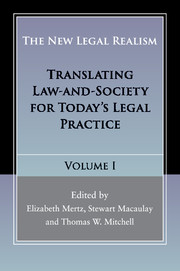Book contents
- Frontmatter
- Contents
- List of contributors
- Preface to The New Legal Realism, Volumes I and II
- 1 Introduction: New Legal Realism: Law and Social Science in the New Millennium
- Section I THE PLACE OF NEW LEGAL REALISM IN LEGAL THOUGHT AND TEACHING
- Section II PHILOSOPHY AND METHODS FOR A NEW LEGAL REALISM
- Section III NEW LEGAL REALIST TRANSLATIONS
- Index
- References
Preface to The New Legal Realism, Volumes I and II
Published online by Cambridge University Press: 05 May 2016
- Frontmatter
- Contents
- List of contributors
- Preface to The New Legal Realism, Volumes I and II
- 1 Introduction: New Legal Realism: Law and Social Science in the New Millennium
- Section I THE PLACE OF NEW LEGAL REALISM IN LEGAL THOUGHT AND TEACHING
- Section II PHILOSOPHY AND METHODS FOR A NEW LEGAL REALISM
- Section III NEW LEGAL REALIST TRANSLATIONS
- Index
- References
Summary
The publication of this two-volume set by New Legal Realist (NLR) scholars marks an important moment in sociolegal development. To a large extent, NLR scholars follow the original Realists in pushing to integrate social science with study and research about law in action. But NLR scholars do so with an astute grasp of fundamental developments in the character of both contemporary sociolegal scholarship and the legal academy. From the start, scholars involved in this movement have been concerned in particular about the limitations and arguable myopia of law school fascination with other movements like Empirical Legal Studies (ELS) or Law and Economics (L&E) in recent years. NLR offers a compelling alternative vision that engages these and other approaches while expanding beyond their limitations. These two volumes make the substantive intellectual case, by argument and example, for the value of such a comprehensive, multidimensional approach to sociolegal studies within the legal academy. The timing of these two new volumes is also propitious and marks a new self-conscious form of engagement. Law schools are in a moment of heightened panic about the crisis of their professional mission, and these volumes outline new directions in both research and teaching that can help to reconcile contradictory pressures that mark the current uncertain situation.
The internal logic of each volume is both sensible and exciting. Volume I's essays focus on practices in U.S. law school teaching, conceptualization, and research about “real-life” law. The key goal is to encourage more successful integration of theoretically sophisticated empirical research from the law-and-society tradition into law school agendas. The collection begins by addressing analytical and epistemological dimensions of law school teaching, conceptualizations, and preparation; then shifts to method; and concludes by offering various “translations” of NLR into specific research questions. This volume is very much a project by and for law school professors who aim to “make law real.” Volume II focuses on “studying law globally.” It proposes to focus “translation” of NLR approaches on “diverse global, national, and local sites of law.” The collection begins with two chapters exploring the concept of “globalism” in relation to specific legal phenomena, and then shifts to questions of global norm transfer (globalism is all about flows, about exports and imports); it then proceeds to institutions and actors, and ends up with inquiries into normative issues of global justice.
- Type
- Chapter
- Information
- The New Legal RealismTranslating Law-and-Society for Today's Legal Practice, pp. xiii - xxiiPublisher: Cambridge University PressPrint publication year: 2016
References
- 3
- Cited by

